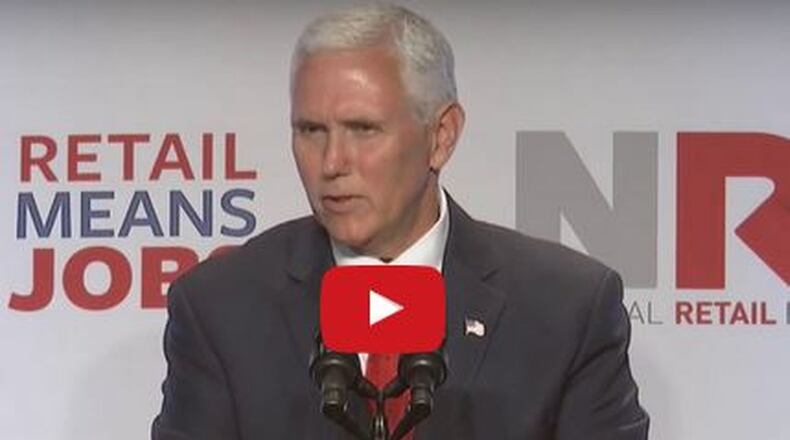PolitiFact last week looked at claims about government bureaucracy, gasoline prices and defense spending by the vice president, a senator and the president. Here are abbreviated versions of our fact checks. Full versions can be found at www.politifact.com.
President Donald Trump “has signed more laws cutting through federal red tape than any president in American history and has already saved businesses and families up to $18 billion in red tape costs every year.”
— Mike Pence on Tuesday, July 18, 2017 in a speech
Experts we spoke with said that other presidents have cut through more red tape than Trump so far, citing the Paperwork Reduction Act of 1995, Regulatory Flexibility Act of 1980, and the Unfunded Mandates Reform Act of 1995, as well as President Jimmy Carter and Ronald Reagan’s deregulation of such previously heavily regulated industries as air travel, trucking, banking and telecommunications.
However, many of these measures were taken through federal agencies, or constituted a single law, whereas Pence cited a record number of laws passed. Pence’s spokesperson Marc Lotter said Trump had signed 14 Congressional Review Act measures compared with one previously. He’s right. The $1.1 billion saved by the historic CRA measures checks out with the Federal Register data. What doesn’t check out is Pence’s statement that these dollars have already been saved. Trump was able to roll back these rules because they had been put in place at the end of the previous administration, which also means many of them hadn’t yet taken effect.
Our ruling
Trump did sign a record number of laws rolling back regulations under the Congressional Review Act, but that’s not the only way to count deregulatory action. Also, Pence is counting eggs before they hatch in using an $18 billion estimate of total savings. The deadlines for compliance for most of the measures he annulled had yet to go into effect.
We rate this statement Half True.
“When the price for oil goes up on the markets, it goes right up, but it never goes down.”
— Charles Schumer on Sunday, July 23rd, 2017 in an interview on ABC’s “This Week”
There are long stretches over the past four decades when inflation-adjusted gasoline prices have gone down.
When we checked with Schumer’s office, they said he was referring to the “rise like a rocket, fall like a feather” theory that gasoline prices tend to go up quickly if there’s a market shock, then fall more slowly after supply and demand resolve themselves.
Severin Borenstein, a University of California-Berkeley economist who wrote a seminal paper on the rocket-feather theory in 1997, he said the senator's formulation is off-base. He said that while retail gasoline prices decline more slowly than they rise, the time frame for these changes is fairly short — two weeks to go up, and six weeks or more to go down.
Our ruling
Schumer’s comment takes a well-known phenomenon and exaggerates it beyond recognition. While experts agree that prices tend to go up quickly after a market shock but usually come down more slowly, this phenomenon only occurs on a short-term basis — a couple of weeks in most cases. Long-term data show long stretches since the mid 1970s when the inflation-adjusted price of gasoline and crude oil have fallen.
We rate the statement False.
“We’ve achieved a historic increase in defense spending to get our troops the support they so richly deserve.”
— Donald Trump on Tuesday, July 25th, 2017 in a speech
Trump’s proposed base spending cap for 2017-18 defense spending is $603 billion, a 9.4 percent increase. There have been 10 years since 1977 when the base level has gone up by more than that, and in some years, the increase more than doubled Trump’s.
Trump wasn’t just saying he proposed one of the largest increases; he said he had already “achieved” it. The spending has not yet been approved. To turn his proposal into a reality, Trump will need Congress to appropriate the necessary funding for fiscal year 2018 as well as change the budget caps currently in effect.
Our ruling
The defense spending increase Trump laid out in his 2018 budget is not an unprecedented change. It’s also not the done deal Trump described. To actually increase defense spending, Congress will have to appropriate the funding and raise the budget cap.
We rate this statement False.
About the Author
Keep Reading
The Latest
Featured

